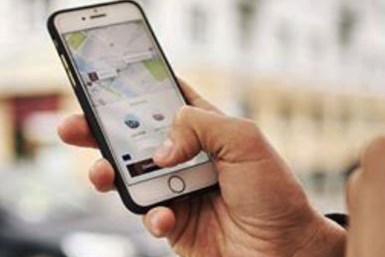Uber and Lyft Hit Hard by Coronavirus
Companies issue new policies as ridership and stock prices plunge
Ride-hailing giants Uber and Lyft, which already were struggling financially, have seen even more dramatic declines than other industries as ridership plunges in the wake of the coronavirus.
Uber’s stock has plummeted 45% over the last month to close at $22.60 on Friday. Lyft’s share price is down 30% ($23.88). By comparison, the Dow Jones Industrial average has fallen 21% during the period.
In its annual financial filing earlier this month, Uber warned that COVID-19 posed a “material risk” to the company’s business due to fewer users. This was a significant shift from a month earlier when CEO Dara Khosrowshahi told CNBC that Uber didn’t anticipate any impact from the coronavirus.
New Policies
In response to the rapid spread of COVID-19, Uber and Lyft have established special task forces and issued new guidelines (Uber’s policy; Lyft’s policy) for drivers and passengers.

Both companies say they will temporarily suspend the accounts of drivers and riders who have tested positive for COVID-19.
Uber goes further, indicating it may include anyone confirmed to have been exposed to the virus. The company is consulting with an epidemiologist to ensure its efforts are “grounded in medical advice.”
In early February, Uber suspended two drivers with had come in suspected contact with the virus. In addition, 240 customer accounts of people who took rides with the drivers were temporarily restricted.
Keeping Vehicles Clean
The ride-hailing companies also are partnering with manufacturers of disinfectants to help drivers keep their vehicles sanitized. Lyft says it is distributing more than 200,000 bottles of hand sanitizers and other cleaning supplies at no cost to drivers.
In addition, Uber Eats customers can request that their food deliveries be left at the door instead of being made person-to-person.
Waymo, which operates a self-driving vehicle fleet—most vehicles have backup safety drivers onboard—in Arizona, also is stepping up its cleaning efforts. This includes cleaning vehicles multiple times a day, providing hand sanitizer for passenger use and requiring backup drivers to wash their hands frequently.
Driver Compensation
Both companies promise to provide financial assistance to drivers who are diagnosed with COVID-19 or is asked by a public health authority to self-quarantine. Uber’s compensation can last up to two weeks. Lyft didn’t say how long it would assist affected drivers.
But drivers have complained that the compensation policies are vague and don’t go far enough. The coronavirus outbreak also has reignited complaints over the employment rights of so-called “gig” workers, who typically don’t receive health benefits and paid sick time.
Emergency complaints have been filed against Uber and Lyft in California and Massachusetts. Citing potential public endangerment, the lawsuits seek temporary reclassification of the drivers as employees to ensure paid sick leave for those affected by the virus—including those who opt to self-quarantine because ample testing isn’t yet available.
RELATED CONTENT
-
The Koenigsegg Jesko Has An Amazing Engine
It is hard to believe that this is a vehicle in “serial” production with such extraordinary powertrain performance
-
Plastics: The Tortoise and the Hare
Plastic may not be in the news as much as some automotive materials these days, but its gram-by-gram assimilation could accelerate dramatically.
-
GM Develops a New Electrical Platform
GM engineers create a better electrical architecture that can handle the ever-increasing needs of vehicle systems








